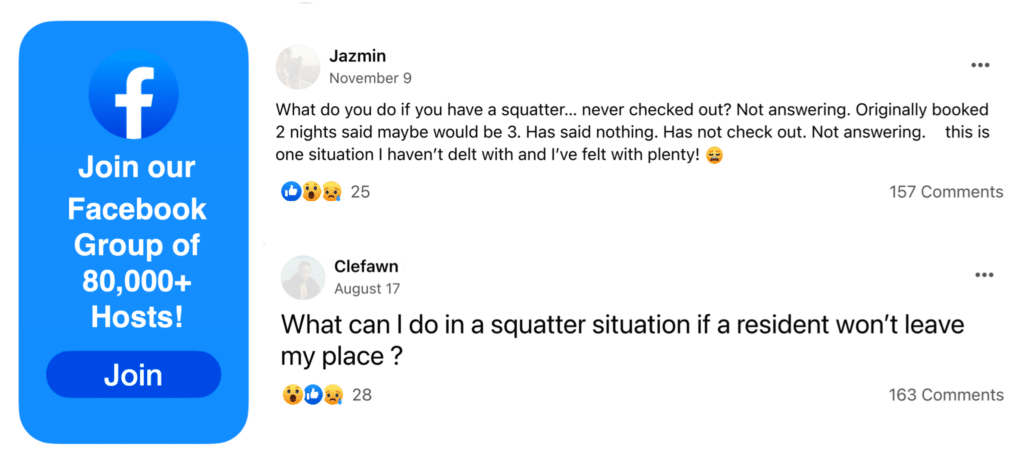
What to Do When an Airbnb Guest Won’t Leave – How To Avoid Squatters
When an Airbnb guest won’t leave, it can turn your short-term rental into a long-term nightmare! As a new Airbnb host, your main concern is probably getting as many bookings as possible, and long stays can be very lucrative. In fact, many hosts have 1 or 2-night minimums. But do you have a maximum stay?
The Dangers of Extended Stays for Airbnbs
There are some advantages to longer stays. There is a longer time between turnover, less spent on cleaning fees, and fewer check-in logistics to deal with. It is important to keep in mind the maximum number of nights your guests can stay, however. Otherwise, you might end up learning how to evict an Airbnb guest.
One of the cons of Airbnb is that without a lease agreement, longer-term guests can cause legal trouble and financial problems for Airbnb hosts. We all want our guests to have a great time during their stay and to leave when that stay is up! Be sure you know the risks of a long-term guest before agreeing to their booking or allowing long stays in your house rules.
My Airbnb Guest Won’t Leave! What Rights do they Have?
Many hosts don’t think to look into landlord/tenant laws when renting out their space. Most people think that one advantage of being an Airbnb host is not having to worry about traditional landlord/tenant problems. However, if you allow a guest to stay for too long, they could develop tenants’ rights.
Know Tenant Rights In Your Area
The law regarding tenant rights is different in every state. In a nutshell, if someone develops tenant rights, you could be unable to get them to leave your property unless you go through the formal eviction process. This can take several months and thousands of dollars.
An Airbnb host in California learned this the hard way. This host approved a 44-day stay for a guest at her Airbnb. He refused to leave at the end of his stay. The guest, in that case, got tenants’ rights after 30 days (as is the law in California) and threatened to sue the host for blackmail (when she tried to get him to leave).
Learn How To Evict an Airbnb Guest
Unfortunately, Airbnb doesn’t yet have a comprehensive way to handle the situation where an Airbnb guest won’t leave. Because the laws vary state-to-state, and dealing with this problem often requires independent legal assistance, it can be difficult for Airbnb to resolve this issue itself. Airbnb does its best to help hosts caught in this situation, but you should do everything in your power to avoid this.
When Airbnb can’t step in, make sure you know the eviction process for your state. Here are a few steps that are commonly involved:
- Send written notice to the tenant
- Wait for the tenant to fail to move out
- File a court eviction with the county
- Court’s judgment rules in favor of the eviction
- Court awards time limit for the tenant to evacuate
- Law enforcement can help remove tenants who miss the deadline
How to Prevent your Guest from Obtaining Tenants’ Rights
The good news is that a lot of the steps you can take to protect yourself from someone seeking to gain tenants’ rights are things you’re probably already doing. Airbnb hosting best practices protect against a range of problems. Be sure to follow these rules to prevent this situation from arising, and protect yourself if you find yourself with an Airbnb guest who won’t leave:
1. Always Get Everything in Writing Through the Airbnb Platform
Nothing good ever comes from communicating with a guest outside of the Airbnb platform. If your guest books for 15 days and messages you outside the platform asking to extend for another 15 days, there’s probably something fishy going on.
We hear stories of guests messaging hosts through text, WhatsApp, and other messaging services. It is sometimes necessary for a guest to have your phone number to call you for emergencies or other issues. If you do have to communicate outside of the platform, be sure to send a follow-up message through the platform confirming any telephone conversations you may have had with the guest. Never agree to message outside the platform. A guest who is pressuring you to communicate outside of the Airbnb platform probably has a reason for this.
2. Watch your Length of Stay Limits- Be Cautious With Extensions
Some hosts think that they can get around the 30-day tenancy rule many states have. They might agree to let a guest stay for 15 days and then have them book a separate stay (or extension) for another 15 days.
While this would look slightly better than allowing one 30-day stay, you don’t want to rely on this to protect you in court.
Don’t agree to any extensions that may make it look like you’re trying to circumvent the laws in your state. Most court systems know when you’re trying to get around a rule, and they don’t look kindly at that type of behavior. Any attempts to exploit a loophole may work against you.
3. Don’t Extend Too Long or an Airbnb Guest Won’t Leave
In addition to refusing extensions that bring you into 30-day territory (depending on your state), you should also not accept any booking requests for 30 days or more. Some hosts get lucky—there are many honest guests who book for longer stays of 30, 35, or 40 days and leave when their stay is up. While we recommend you never let a guest stay for longer than 30 days (or whatever the length of stay is in your state that allows them to obtain tenants’ rights), if you choose to allow this, there are some further protections you can take.
4. Get Smart Locks and Security Cameras
We advocate that hosts use smart locks on their listings. At a minimum, it improves convenience for guests. Smart locks can also improve security by allowing you to lock the listing remotely and automatically revoke access to any guest after their designated checkout time.
Security cameras on the exterior of your listing will also tip you off if a guest is up to no good. Although these need to be disclosed on your listing description, they allow you to see how many people a guest brings with them and whether or not they’re following your house rules. When you notice them moving in their own furniture on the cameras, you can safely assume that your Airbnb guest won’t leave on time.
5. Be Picky About Who You Approve
If you want to avoid having a guest not leave, be picky about who you approve. There is a lot of advice about this topic that urges hosts to draw up a contract or agreement and have the guest sign, agreeing that they will not become a tenant even if they are staying 30+ days.
Unfortunately, that’s not usually how a court will determine whether or not the guest has tenants’ rights. Because tenants’ rights automatically come into effect after a certain period of time in many places, it’s more about behavior than contracts. Contracts won’t hurt you, but don’t let them give you a false sense of security.
6. Check the Ratings
The best predictors of whether or not a guest will cause you problems are things you should already be looking at: how many ratings they have, how good their ratings are, and your general impression of them. In the case of the California host who approved the 44-day stay, the guest had no reviews on Airbnb, and she never independently verified his identity.
If you choose to allow a longer-term guest, it is perfectly reasonable to require them to verify their identity, check their social media pages, and have a longer discussion with them before approving their request. If you’re careful, it’s highly unlikely you’ll have a situation where an Airbnb guest won’t leave.
7. Ask Other Hosts How To Evict an Airbnb Guest
We hear stories from hosts all the time who regret not trusting their gut feeling about a guest. Usually, the guests who ask for discounts before you’ve even approved the booking or who complain that your listing doesn’t look like it should cost as much as it does will be the same guests who cause damage or write a negative review.
When it comes to approving a long-term stay, the stakes are even higher than a bad review or a broken lamp. Do not approve their request if you have anything other than a great feeling about a potential longer-term guest.
8. Make the Rules Clear
Your listing, welcome book, and messages with guests should always include your house rules about check-in/check-out and extensions. Every host knows that many guests don’t read your entire listing, and some don’t read your welcome book. Because of this, it is important that you have the rules and information clearly written in several places.
- We also recommend reminding them of the policy in your initial check-in message using automated messages. For example, note that guests must check out by 11:00 on the last day of their stay, and cannot extend without prior agreement from the host.
- If you choose to put an Alexa in your listing, you can have it automatically remind guests of these rules.
- Use your Alexa to set a reminder about checkout times.
- You should also state that no agreements will be made or discussed outside of the Airbnb platform.
9. No Late Checkouts
It can also help to remind the guests that the check-out time is non-negotiable, as you may have new guests arriving that same day. If an Airbnb guest won’t leave and tries to claim that there was some agreement that they could stay longer, your messages and posted rules about new guests arriving, along with your policy against extensions, will help.
This shows that you are running a short-term rental and have no intention of becoming a landlord. It also shows that you were not trying to mislead your guest into believing they were becoming a long-term tenant.
10. Don’t Take Matters Into Your Own Hands When an Airbnb Guest Won’t Leave
If you find yourself in a situation where your Airbnb guest won’t leave, your first step (as always) is to notify Airbnb immediately. If the guest has been there a short time and has not yet obtained tenant rights, Airbnb can usually help resolve the situation.
Things get trickier when the Airbnb guest won’t leave and may have tenant’s rights. You should still contact Airbnb, and if they cannot resolve it, call the police. What you should never do, however, is attempt to forcibly remove the tenants from your home.
Tenants’ Rights Are Legal Rights
It sounds crazy, but if they have indeed gotten tenants’ rights, then you could be breaking the law in that case by illegally evicting them without going through the proper process. At best, you are looking at a scathing review. At worst you could be facing criminal charges! Once you find yourself in that position, you’ll want to hire a lawyer to follow the process properly.
As always, trust your gut about all guests, regardless of the length of stay—and take the time to learn the laws in your state, local municipality, or country to avoid finding yourself in a situation where your Airbnb guest won’t leave.
Have other specific questions about your situation? Ask our community over over 80,000+ hosts!

About the Author Kevin Kelsey
Originally from Connecticut, Kevin moved to Los Angeles in 2013 and worked his way up to becoming an editor on award-winning reality TV shows. Kevin owns 4 short term rentals in Southern California and founded AirHost Academy to help other hosts improve their business.
Related
How To Start An Airbnb Business
How to Leverage Profit First for Your Short-Term Rental Business
How To Gain a Competitive Edge & Thrive in Your Evolving Vacation Rental Market
How to Manage Short-term Rental Finances Using Baselane Banking
New Short-Term Rental Bans, Rules, and Regulations: How Hosts Can Adapt
How To Create A Mid-Term Rental That Guests Will Love
A Quick Guide to Short-Term and Mid-Term Rentals: Which One Is Right For You?
Q&A About The Airbnb Community Fund
